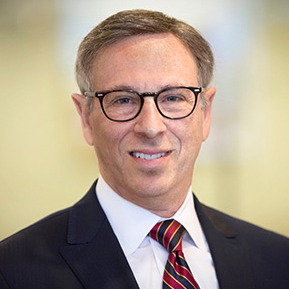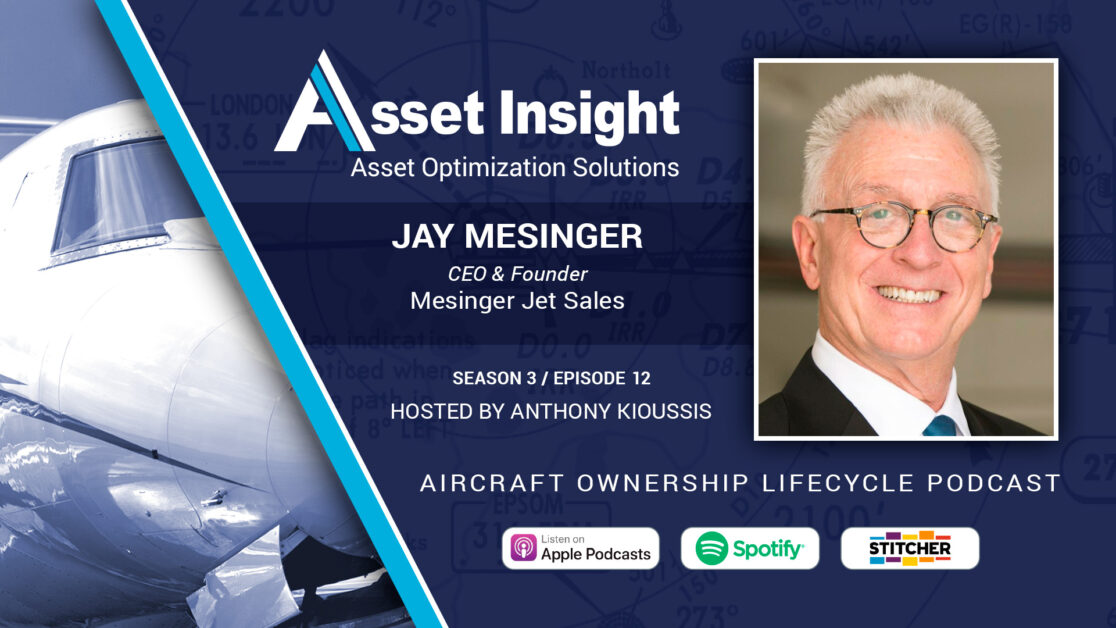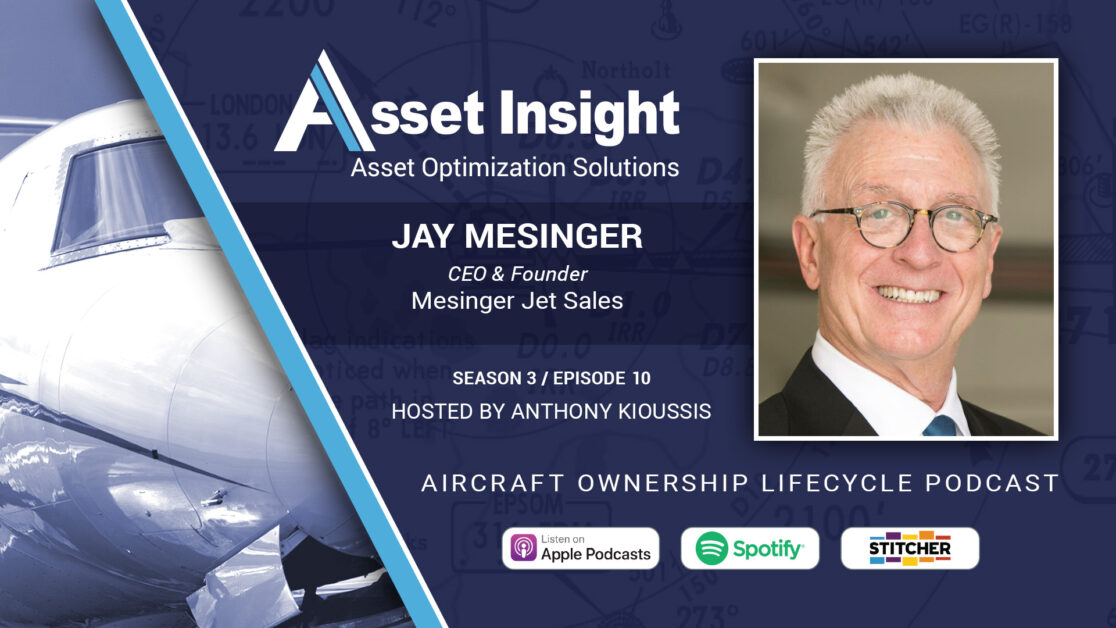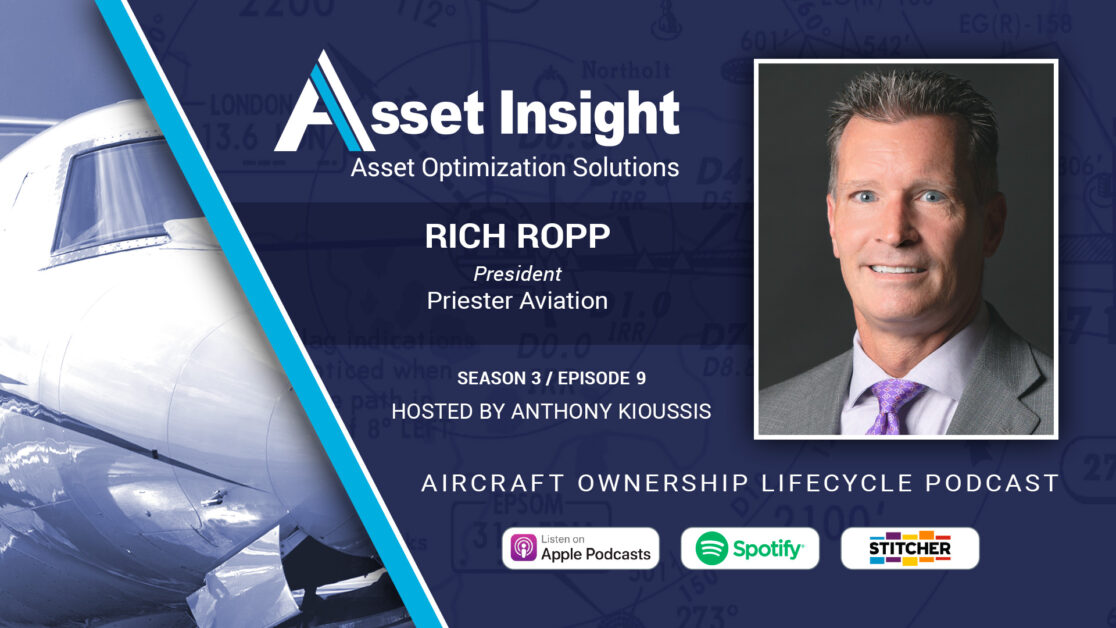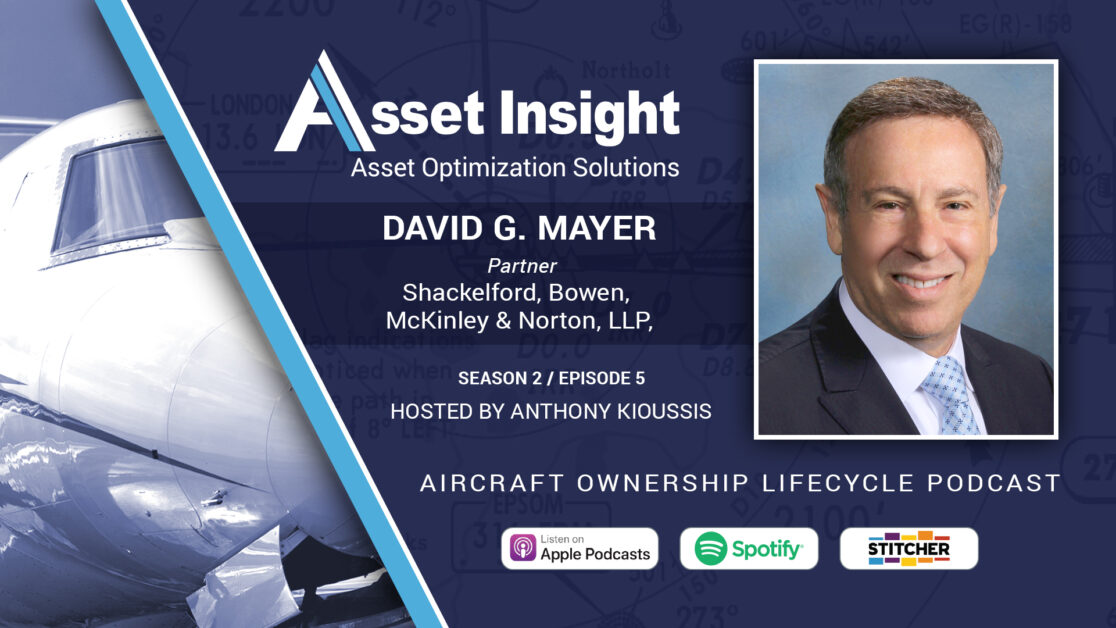
SEASON 2 • EPISODE 5
What First-Time Private Aircraft Buyers Need to Know
With statistics showing the number of first-time aircraft buyers to be at perhaps an all-time high, David Mayer, a Partner at the Shackelford, Bowen, McKinley & Norton law firm, discusses what first-time private aircraft buyers need to know. This conversation touched on numerous topics, including:
- The types of entities seeking to acquire an aircraft for the first time, and what is motivating their acquisition.
- The private flying familiarity shared by first-time buyers, and their level of knowledge about buying an aircraft.
- How far a first-time buyer’s aircraft search is likely to have progressed before they turn to an aviation attorney for assistance.
- The top three topics first-time buyers most want to discuss.
- Guiding a first-time buyer through the acquisition process.
- The top three issues aircraft owners are likely to face once their purchase has closed.
- Services an aviation attorney can provide to first-time buyers that they need to consider.
About David G. Mayer
David Mayer has decades of experience in guiding clients through domestic and international transactions, disputes, and other matters. Currently, most of his work relates to business aviation and aircraft finance.
He likes to describe when he can first help clients: “When they say airplane, I’m in.” In this regard, David advises his clients at all stages of their experiences in buying, selling, structuring, leasing, financing, maintaining, and upgrading private aircraft. His tasks range from simple to complex.
David helps clients evaluate and, when feasible, minimize local, state, and federal taxes, particularly bonus depreciation, associated with purchases and sales of business aircraft, turboprops, and other private aircraft, comply with federal aviation regulations, and manage liability risk that they worry an aircraft may cause.
He represents, among others, high wealth individuals, large private and public companies, private jet owners and lessees, Part 135 and Part 91 operators, flight departments, charter operators, brokers, consultants, and management companies. By representing various lessors, lessees, lenders, and borrowers, David knows both sides of the transaction, enabling him to expedite and achieve favorable results for his clients in a wide array of legal matters.
David has experience as a corporate counsel in addition to his longer experience as a partner in law firms. Adapting to the client’s interest, David provides insightful, thoughtful, and common-sense advice honed in part by calling on his extensive industry contacts in business aviation to enhance the quality and value of the client experience.
He writes blogs for Aviation International Network, in the industry’s AINsight series, which, in part, positions David at the leading edge of legal and business developments in business aviation.
Shackelford, Bowen, McKinley & Norton, LLP
Shackelford, Bowen, McKinley & Norton, LLP represents clients in matters involving business, commercial and entertainment law based on years of experience in courtroom trials and negotiations across the U.S. We assist large corporations as well as individuals in a variety of industries, including aviation, energy, entertainment, financial institutions, health care, hospitality, real estate, and retail automobile sales.
Tony Kioussis (00:33):
Welcome to another Asset Insight Podcast covering the aircraft ownership life cycle, I am Tony Kioussis, president of Asset Insight and your host. Last summer, David Mayer, a partner at the Shackelford, Bowen, McKinley & Norton law firm joined us to discuss business and legal issues one should consider when acquiring a new or pre-owned business aircraft. The information in that podcast was not only well received, the episode continues to have a very active audience. So with statistics showing the number of first time aircraft buyers to be perhaps at an all-time high, we asked David to discuss what first time private aircraft buyers need to know. Thanks for joining us again David, I’ve been looking forward to this conversation.
David Mayer (01:21):
And I’m delighted to be here at Tony. It’s a very interesting time and changing time in the business.
Tony Kioussis (01:28):
So for first time buyers, what types of entities do you see as first time buyers, and what is motivating their interest in aircraft acquisitions?
David Mayer (01:38):
As to the types of buyers Tony, it’s pretty standard, stable types. It is primarily high net worth, ultra high net worth, and small to midsize companies with the balance clearly on the high net worth.
Tony Kioussis (01:57):
Do first time buyers talk about their experience, if any, with private flying either through charter, or fractional aircraft use before your first conversation?
David Mayer (02:08):
Well, typically when I had first contact with one of the individuals, they will talk about whether they’ve had any experience or what their motivations are. It seems a majority of the potential buyers have chartered, some have used jet cards, many of them have flown with friends or done a certain shared use of aircraft, but they haven’t owned a whole aircraft. Those who have had fractional shares try to relate, it’s a whole aircraft, but that is a big step to make in the process.
Tony Kioussis (02:45):
How do they describe their knowledge of buying an aircraft and how the acquisition process works?
David Mayer (02:52):
Many of them say, “Look, this is the airplane I’d like, now what do I do?” Or, “I’ve using a fractional share, but it’s really not working well enough for me. I need more flexibility, now what do I do? How do I get to the next airplane?” Or another version of this is they’ll say, “I’ve got a broker, I’ve test flown a couple of different airplanes, here’s the airplane I have in mind. I would appreciate if you could guide me through this process of trying to acquire this aircraft.”
Tony Kioussis (03:26):
So they usually have an aircraft in mind. Do they have a broker at this point? Or have they already signed a letter of intent or a purchase agreement? Where are they from that perspective?
David Mayer (03:38):
Tony they come in at different points in the process. It seems that in the last year or so, perhaps the last two years, they do identify a broker or a manager in each case with the skills they think they need to find the airplane that they want, and they come to the table with that being their starting point. Most recently, I’ve seen managers who happen to have aircraft in inventory who try to sell the aircraft and induce the potential buyer into a management arrangement. They come in at all stages, pretty much without evaluation of the first steps they’ve taken on the part of aviation experts.
Tony Kioussis (04:22):
What are the top say, five points or issues that new buyers want to talk about when they’re pursuing their first aircraft?
David Mayer (04:31):
It depends on the orientation of the buyer to tax liability as one item. If a buyer is interested in a bonus depreciation, that issue will come up front, center and first with a discussion that’s like, “Well, I have a big monetization event this year. I really am going to pay a lot of taxes on this. I want to buy an airplane and get bonused depreciation.” Not knowing at all, whether or not depreciation would apply in that case, the bonus depreciation, or whether there’s structuring. They just know they want to reduce tax liability. That’s one scenario and I expect that one to remain front and center in this year due to the uncertainty of whether the tax law will change and bonus depreciation will either be reduced or eradicated by the current administration.
David Mayer (05:27):
Another one that comes up a lot, particularly with new potential owners is personal liability. They have an image that they’re going to have a personal liability reach them and their assets so the way to fix that they think is to form an LLC. So they might start off with saying, “Well can you form an LLC for me so I’m protected from liability?” That gets into a discussion of whether the LLC works for that purpose, but is a very common element. And these are the legal issues that tend to be front and center, but then they will work toward the type of aircraft that they have in mind and the affordability or budget they have for it. So those are the initial issues that tend to come up, but it’s very much fine tuned for the individual who is the potential buyer.
Tony Kioussis (06:24):
Once you talk through a new buyer’s initial questions, then what’s next? How do you move ahead to inform and guide new buyers?
David Mayer (06:33):
At that point, it’s important for the buyers to know exactly what kind of a project it is to acquire an aircraft and this is the point at which some of the really big issues need to be addressed and let them have an opportunity to process the notion that buying an aircraft is not like buying any other kind of asset. Sometimes the potential buyer or client in this case, will be a very sophisticated business person, many of them are, but then will try to tie together their business acumen with buying airplanes as if it’s all the same or they can understand the concepts and they can lead the charge. That sometimes is a challenge for me because the first thing I need to share with them is that these are complicated assets and a complicated process. So what I like to do is to give them a very high level, almost business understanding of how to approach and how to understand this. So there are a few points that I share.
David Mayer (07:44):
First, I urge them absolutely at the beginning to develop a team of experts who can help guide them through the various steps from what I described as the talking about an airplane, it’s sort of getting the keys. And those experts, they don’t necessarily know who they are or what they can do. I’ve become more convinced the more of the new buyers I’ve talked to, that it is critically important to start with brokers who are of high quality, deep knowledge and well-seasoned in the sense that they have long experience and hopefully experienced in a particular type of buyer and aircraft, followed by having a very seasoned, experienced, knowledgeable aviation counsel. Once those two professionals are in place, there are other folks that they need to get to know who they are, at least categorically, such as consultants who can help value the aircraft, who can evaluate the maintenance, who can give them an idea of what their operating costs will be and goes ultimately to the second big issue, which is to understand exactly what they’re getting into.
David Mayer (09:01):
That means they have to understand and specify the mission, the use of the airplane that they want. They need to understand how ownership, operation, and maintenance imposes a lot of responsibilities on them. They need to understand tax benefits broadly and that’s federal, state and local, and they need to understand in the main and fundamentally that it’s a complex process. Unfortunately, sometimes with the business acumen that folks have, they don’t necessarily keep an open mind. They make choices of pilots or of an aircraft, or of a broker, or of a manager before they get that good advice and they tend to stick to that without the input that experts could provide that might guide them in other directions. I have this happening right now where a client has decided on a manager, has decided on the pilots, has decided on the airplane, but has done no evaluation like the types of individuals I’ve described and doesn’t have a broker, but has a manager trying to sell an airplane, and this is a situation I’ve seen before that doesn’t necessarily lead to a good outcome for the client.
David Mayer (10:14):
And the next thing is that they participate. What I suggest is that they learn to lead and by that I mean that they keep an open mind as to all these selections and decisions they make. They ask questions, they try to learn the complexities and they learn enough to help guide the whole team with their advice on how to do these transactions. And finally, they have to be patient. It’s not like buying a car. It’s not like buying a house. It takes a lot of time. There’s complexity involving the buy, sell, finance, the federal regulatory structuring, risk management and general transactional and that takes time, and it’s important for them to have a sense that being patient is a critical part of the process, especially in the current market where it’s hard to find good aircraft with inventory down as you know.
Tony Kioussis (11:10):
Excellent comments, excellent suggestions, and really well thought out. When the purchase is closed, what are the top three points or issues that buyers should expect to encounter?
David Mayer (11:23):
Tony it’s more a concept or a culture of being an owner of a valuable and interesting asset that is highly regulated and involve many different relationships. Point one, it’s important that the new owner understand that relationships with managers, lenders, co-owners, and other vendors starts at closing. It isn’t that a contract is in place and all is well. These assets take some TLC and the relationships and the trust developed with them are very important, and that includes the team they initially contract to help them acquire the aircraft. They are a valuable continuing resource. That’s point one.
David Mayer (12:09):
The second point is to develop a culture of regulatory compliance and health and safety with the aircraft. Of course, the pandemic has changed much of the way we think about safety around an airplane. It has expanded to the potential for transmitting disease and that hopefully over time will diminish, but the concept of health and safety with respect to an aircraft should always remain front and center.
David Mayer (12:38):
And in the regulatory compliance element, it’s important that owners realize that if they’re flying part 91 or even part 135, that the FAA has many, many regulations that they need to comply with, and in particular, we focus on keeping operations legal. That is not having flight department companies. Well, what is that? Flight department company is a company that has no business essentially, other than flying an airplane, which is straight down the middle illegal, and that’s a place that in the culture of regulatory compliance, no owners should go. So that is worth talking to aviation lawyers and making sure that that’s right.
David Mayer (13:23):
And the last one is, for many of the areas in which flights occur or discipline is established, for example, for logs of flights, for people on board, for health and safety protocols recorded, it is important that there be detailed record keeping for the use, for regulatory reasons, for the IRS or a state agency that may come to call, and to show that the airplane is being cared for properly. Those are the three things that I think are key going forward, and to keep relationships healthy so you have people to help a new owner through all of these areas.
Tony Kioussis (14:08):
I think that points to how complex it can be to own your own airplane and operate your own aircraft and as great as private transportation is, there are a lot of complexities to it. So I guess my final question would be, what is it that we haven’t discussed? What are some of the necessary services a firm like yours and you in particular can provide first-time buyers that they need to consider?
David Mayer (14:35):
Thanks for asking that question Tony. I share with buyers that as soon as they say airplane, I’m in. And by that, I mean that it’s a really great place to work with buyers because part of what I feel my obligation is to reach out to the highest and best resources in our industry, realizing that no matter how much I know and the decades of experience I have, that there are experts like yourself in consulting. There are insurance folks who do nothing but aircraft coverage in a difficult market. There are brokers who have demonstrated success and quality and what they do that I like to access for my clients. And then they’re just a series of legal issues, starting out with creating a roadmap for a client to let them know as if they’re in a passenger seat, where they’re going to be going, the route they’re going to be taking.
David Mayer (15:32):
And this sometimes comes out for the lawyering side, ultimately in checklists, but the strategy and the information, the education almost feels like a fire hose for the client. But it’s important to make sure that they get more and more comfortable, that they develop trust, and that is probably the most important thing I can do for them, is to develop trust a basis of knowledge so that when I bring other people to help them to the table, or we take steps down the negotiation line, they feel comfortable that they’re being taken care of and that’s extremely high priority. So when they talk about the process, I will talk to them about co-ownership, whether they want to have others who will use the plane. I talked to them about management companies and whether they want to fly privately and have their own crew versus have someone manage the plane. Tax planning is huge for people to understand something that we work on every day.
David Mayer (16:29):
And that’s federal tax depreciation, state sales and use tax, and even local property tax. There’s a lot of money to be overspent that shouldn’t be and a lot of money to be saved in these areas if the planning is right. I can’t stress enough to folks that they need to know they’re getting a claim machine. That they do inspections properly both before and during the APA, the purchase process. That they’re regulatorily compliant and if they want financing, this is an area where I have very deep and long background. I won’t tell you how many decades, but it’s more than three of financing, that they oftentimes come to me and say, “Well, I have my local banks that can do this,” but I try to counsel them that either the pricing is not optimal or the team at their local bank may not have the experience that advantages them the most, but I’m happy to work with their local resource if that’s what they want to do and their relationship is there, and that relationship is critical.
David Mayer (17:30):
And then to stay with them, to be a hand, to ask questions as they go forward as owners and hope that they develop that culture of three points that I mentioned earlier. So it’s really a fun and challenging area. Particularly if a client, buyer is open-minded to share all that this complex and interesting and close industry offers them. I always look forward to working with the new buyers and yes, it has been a big year for new buyers, but I’ve seen this trend for probably five years now. I’ve seen many new buyers come to me and I’m delighted to help them.
Tony Kioussis (18:10):
This has been another Asset Insight Podcast covering the aircraft ownership life cycle. Please visit our ever-growing podcast library at assetinsightpodcast.com and select from any number of topics discussed with business aviation industry experts. This is Tony Kioussis and as always, thank you for listening.
Don’t forget to share this podcast!
